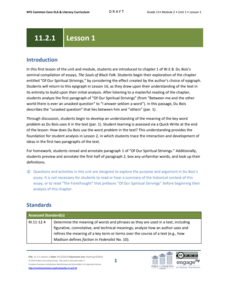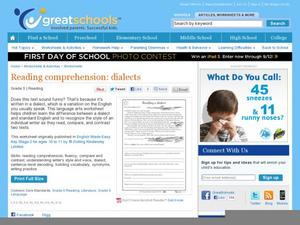Curated OER
Its or It's
What's the difference between its and it's? Clear up any misunderstandings in your third grade language arts class. Practice sentences use its or it's twice, prompting learners to use context clues for each usage. At the end of the...
Curated OER
Setting the Tone with Figurative Language
Explore figurative language with your secondary class. Extending a language arts unit, the lesson plan prompts middle schoolers to examine how an author's word choice establishes a story's tone, possibly using metaphors, similes,...
Curated OER
Grammar Worksheets: Using Strong Verbs
Strengthen your pupils' writing with this worksheet, which provides a reference guide to using strong verbs instead of forms of is and have. Learners then rewrite twelve sentences to make them stronger. This is a great activity to work...
Curated OER
Fast Fact-Finding
Ever wonder why the sky changes color so often? Readers examine an informational excerpt from John Farndon's How the Earth Works. They underline key points as they read and then answer five response questions. Prompts review main points,...
Curated OER
Drive the Data Derby
Three days of race car design and driving through the classroom while guessing probability could be a third graders dream. Learn to record car speed, distances traveled, and statistics by using calculation ranges using the mean, median,...
Curated OER
Vocabulary Packet: Multiple Approaches
Looking for a complete vocabulary and spelling packet focused on high frequency words? Look no further. This printable packet includes six worksheets with activities to reinforce spelling and vocabulary competency. Learners complete a...
Curated OER
Introduce Vocabulary: Clouds (Bauer)
What type of cloud is that? Explore meteorological vocabulary using Marion Bauer's book, Clouds (although these strategies could be used for any fiction or nonfiction text). Pre-teach the new words before reading the story aloud....
Curated OER
Butterfly, Butterfly: Teaching Vocabulary
Kindergarteners practice new words through listening to and reading the science book Butterfly by Jenny Feely. The teacher will first choose words that are essential for understanding the text. Then, using pictures in the text, pupils...
Curated OER
Affix This
Wait, what am I supposed to affix? Explore the concept of roots/affixes with your class. They use discussion questions to discover the meaning and usage of specific roots and affixes. They watch a video explaining Latin and Greek roots...
San José State University
Possessive Apostrophes
A great review of possesive nouns and how to add apostrophes. Clearly demonstrating where to place the apostrophe for different nouns, the resource also notes some tricky exceptions. Reinforce the concept with a little practice putting...
Curated OER
Home Living / Daily Living: Safety Terms
Being able to recognize safety signs in your environment is a great start to staying safe. Kids with severe to moderate disabilities work to recognize and identify safety terms and signs. They use flashcards and decreasing prompts to...
EngageNY
Grade 11 ELA Module 2: Unit 1, Lesson 12
Readers closely examine paragraph nine in Du Bois's "Of Our Spiritual Strivings" to understand prejudice's meaning and research Jim Crow laws.
EngageNY
Building Background Knowledge: Vietnam as a “Battleground in a Larger Struggle”
Read. Stop. Think. Scholars use a reading strategy to process the challenging text, "The Vietnam Wars." They read a paragraph and then stop to think about the text and its meaning. Readers then go on to work with partners and make notes...
EngageNY
Reading for Gist and Answering Text-Dependent Questions: Chapter 4 of World without Fish
True or false? Scholars read chapter four of World without Fish and explore the idea of a myth. They discuss in triads the meaning of the myth of nature’s bounty. Learners annotate the text on sticky notes and then answer text-dependent...
EngageNY
Tracing the Idea of Fish Depletion: Chapter 2
Scholars read chapter two of World without Fish to learn more about the fishing industry. Learners discuss in triads what it means for fishing to become an industry. They then write the gist of pages 28-33 on sticky notes and answer...
Ohio Department of Education
The Solution is Complex
Consider complex numbers, roots, and quadratic equations. Use the discriminate as a way to determine the nature of a quadratic's roots. Then discuss the similarities and differences between quadratics with two, one, or no real roots....
Curated OER
Sequence, Predict, Infer: Pink and Say
Practice sequencing with your 2nd graders via Patricia Polacco's Civil War book Pink and Say. Begin with a blindfold and a bag of mystery items. Connect their use of clues to identify what they can't see with the skill of making...
Curated OER
Comprehension Instructional Routine: Sequence of Events in Text
If you're looking for a detailed instructional activity on event sequencing from informational text, you've found it. There is an entire script for you to draw from as you explore order of events and sequence words. Scaffolding is key...
EngageNY
Grade 11 ELA Module 2: Unit 1, Lesson 1
When is a word more than just a word? Scholars examine the significance of a word used by W.E.B. Du Bois in "Of Our Spiritual Strivings." Readers carry out a deep discussion of the use of the word problem in the text. After sharing ideas...
Curated OER
Lesson: Word Exploration
The painting Molten Polyester shows two words that contrast greatly with the image they are juxtaposed against. The artist bends the meaning of the words to create a new form of visual communication. Learners analyze the painting and...
Curated OER
Spelling
After viewing this slide show, which goes over the mosts common reasons for misspellings, students take a short quiz. They must choose the correct version of the underlined word in each sentence, or choose option D; which means "no...
Curated OER
A Story
What fun! Beginning readers complete a story by filling in missing letters of CVC words. Each word has an accompanying picture to help youngsters decode meaning. They complete first, medial, and final phonemes for 13 words. Once they are...
Curated OER
Babylonian Mathematics I
Learners examine a Babylonian clay tablet and the mathematics found on it as a catalyst to investigate a variety of mathematical ideas. They work with prime numbers, classify numbers as whole, integer, rational, or irrational and use...
Curated OER
Reading a Dialect
Reading a dialect can be difficult; show readers that it can also reveal fascinating details! They read two extracts from Jane Gardam's The Hollow Land, which is written in a British dialect. Readers answer comprehension questions,...
Other popular searches
- Multiple Word Meanings
- Word Meanings in Context
- Foreign Word Meanings
- Word Meanings From Context
- Similar Word Meanings
- Clarify Word Meanings
- Vocabulary. Word Meanings
- Word Meanings Lesson Plans
- Glossary Word Meanings
- Meanings of Word Parts
- Word Meanings/definitions
- Multiple Word Meanings 4th

























